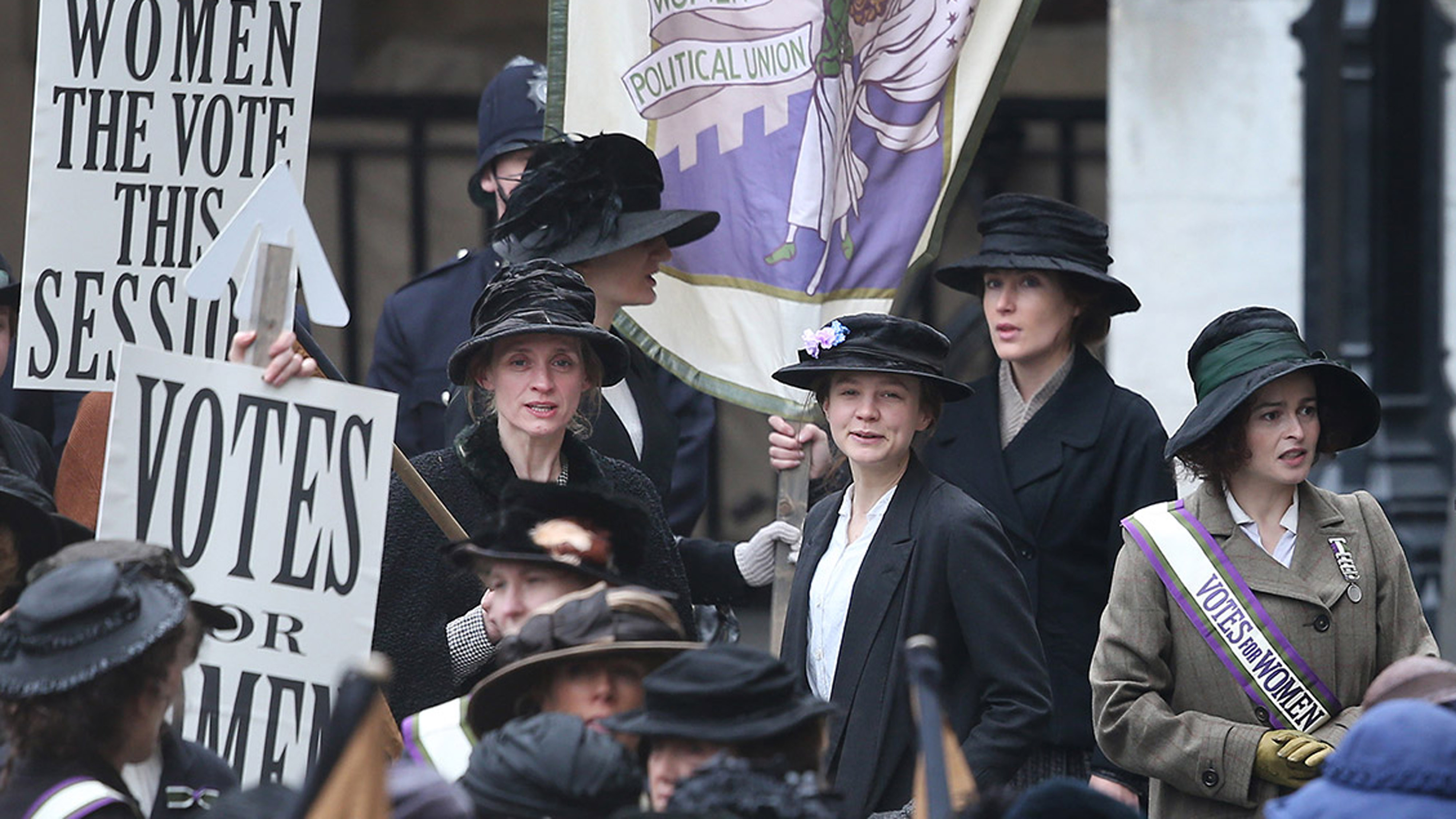I first heard about Suffragette a few months ago when I saw its trailer juxtaposed with that of the upcoming biopic He Named Me Malala. You don’t need to have a degree in Women’s Studies to know that the struggle for women’s suffrage was won roughly a century ago in most so-called developed nations, and indecently recently in others. Indeed, in many countries it is still perfectly legal to treat girls and women as second-class citizens, restrict their education, remove reproductive choice of any kind, and forbid them a driver’s license as well as the right to vote. Young Nobel Peace Prize recipient Malala Yousafzai, lest we forget, survived a bullet to the brain at the age of fifteen for the great sin of demanding schools for girls in her native Pakistan back in 2012.
Suffragette unfolds exactly 100 years earlier, in London, England. Instead of training its lens on one of the Big Names of the movement—Mrs. Emmeline Pankhurst, for example (played in a cameo by Meryl Streep)—or, indeed, on any of the many upper-crust ladies who fought for the cause, scriptwriter Abi Morgan‘s story follows one poor washerwoman, Maud Watts, as she is pulled into the zeitgeist by another, Violet Miller.
Played by a delicate-but-fierce Carey Mulligan, Maud is no typical activist. She puts in long days in the laundries, buffeted by steam, worn out by lifting and repetitive strain, exposed to caustic chemicals. At the age of twenty-four (going on forty), she is wife to a decent man and mother of a tiny boy. They live in tenement slums, and laundry forms much of the scenery here, too. Even in her dire straits, she possesses just enough to have something to lose. When the opportunity arises to commit fully to the cause with the other women (many with far more financial and emotional support than she and her fellow washerwomen), she risks it all.
There are harrowing scenes of police violence on female protesters (of all classes), arrests, imprisonment, a particularly symbolic force-feeding, and a significant act of martyrdom. Let there be no doubt these women suffered to win suffrage.
So why did this earnest film fail to hit me in the gut? Most of what I did feel seemed to have been mildly engineered—as if I had been told about the violence, not shown. No single element is wholly to blame.
Although we hear Mulligan’s grim determination in her voice and see it in her actions, her face is stoic to the point of barely registering emotion.
Although we hear Mulligan’s grim determination in her voice and see it in her actions, her face—often shot in loving close-up—is stoic to the point of barely registering emotion. (Anne-Marie Duff, who plays Violet Miller, uses her soulful eyes to much more convincing effect.) The direction is a little scattershot in places (and be forewarned about a shaky handheld camera), but director Sarah Gavron manages to keep the action apace. I enjoyed Abi Morgan’s narrative arc and her refusal to rely on a barrage of stirring speeches to make her point (though Streep does offer one strong oration). She hints at the ecology of the average activist group and how, over time, different characters tend to emerge: the hard-liners, the moderates, the equivocators, the voices of reason, etc. I wish there had been more discussion of these types, and about the “common enemy” phenomenon that brings together people who usually never speak to each other (as the two divergent classes do in Suffragette), but that would surely have taken the story in another direction.
Perhaps my greatest quibble lies with the tight timeframe. If the production team’s goal was to leave the audience with a sense of a vitally important job unfinished, a triumph delayed, then they succeeded. As such, the movie works quite well as history and even doctrinaire feminism. But it does so at the expense of a truly satisfying tale. If you want your paying customers to walk out of the cinema with a full story arc that actually feels like one, don’t expect them to settle for a list of stats to wrap it all up at the end. Epilogues are not all that popular in novels anymore, and they are even less effective on film.
That said, the statistics are powerful in and of themselves. Those brave British suffragettes of 1912 had to wait another six years for the right to vote—and even then it was only granted to property owners older than thirty. Not until 1928 did voting rights for everyone over twenty-one come to pass. In the United States, suffrage passed eight years prior, in 1920. In Spain it passed in 1931, France in 1944, Pakistan in 1956, and Switzerland in 1971. Kuwait passed the law in 2005. While in other parts of the Middle East, women are waiting still. FL









